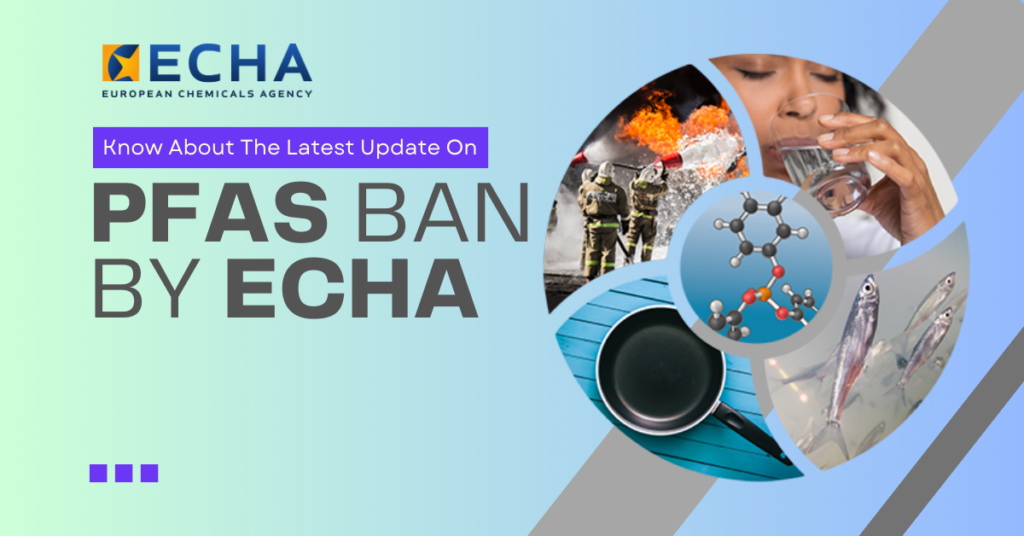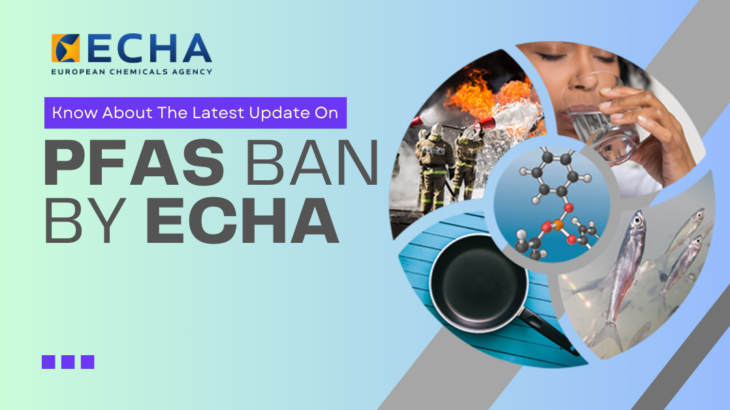
The European Union (EU) has been actively engaged in various discussions and regulation measures to control per- and poly-fluoroalkyl substances (PFAS). These man-made chemicals are recognized for their presence in the ecosystem and associated health hazards.
Hence, the EU has made substantial strides in mitigating PFAS contamination. One notable initiative to regulate PFAS involved the restriction proposal jointly developed by authorities in Denmark, Germany, the Netherlands, Norway, and Sweden.
On January 13, 2023, the restriction proposal was submitted to the European Chemicals Agency (ECHA). The primary aim of submitting the restriction proposal is to prevent PFAS emission into the environment and the potential risks imposed by the same. However, the submitted restriction proposal underwent a six-month public consultation, starting from March 22 to September 25. Hence, this blog discusses the updates on PFAS by the ECHA.
Update On PFAS By The Plastic Industry:
Following the conclusion of the consultation on September 25, ECHA received over 5,600 comments submitted by more than 4,400 entities, including organizations, companies, and individuals.
The plastics industry has expressed concerns that the present proposition aimed at limiting PFAS within the European Economic Area lacks the necessary differentiation among various substances, each of which should be subject to individual regulation.
Similarly, Plastics Europe Germany finds that fluoropolymers are vital in industrial procedures and are not categorized efficiently as these products pose minimal risk.
Hence, the plastics industry seeks an exemption for fluoropolymers. While companies involved in PFAS production are exploring alternatives to discontinue PFAS polymerization aids, a temporary relaxation on them remains essential. Also, there is a need for a supportive framework to facilitate this transition.
Impacts On Plastic Industry:
An extensive PFAS ban has garnered the attention of the plastics industry very much. For instance, plastic machinery manufacturers find that such a ban poses a severe threat to the survival of numerous companies. Also, they say that the current regulatory proposal aims to prohibit all fluoropolymers utilized in hoses, seals, fittings, valves, and pumps.
These manufacturers caution that, in various applications, there are no viable alternatives to these materials. The Association of German Mechanical and Plant Engineering (VDMA) advocates for exemptions for PFAS substances contained within machinery and that do not have direct contact with the environment.
What Plastic Industry Thinks About EU PFAS Ban?
Plastic machinery construction, plastics manufacturers, and plastics processing firms find that fluoropolymers, a subset of PFAS compounds, are primarily non-toxic and non-bioavailable, resulting in minimal environmental and human health consequences. Consequently, a comprehensive PFAS ban is viewed as disproportionate.
Furthermore, the substances employed in machinery are typically non-hazardous and essential for their operational efficacy. The existing PFAS regulation encompasses all substances prohibition, disregarding that only hazardous materials should be excluded.
Next Step: The Evaluation
ECHA has stated that the comments it has received will undergo examination by its scientific committees responsible for Risk Assessment (RAC) and Socio-Economic Analysis (SEAC).
The five nations that initially formulated the proposal will also assess the feedback obtained during the consultation, possibly adjusting their original proposal based on this input.
RAC and SEAC are tasked with evaluating the proposed restriction, considering all the pertinent information received through the consultation process. These committees formulate independent scientific judgments through meetings during which preliminary opinions are thoroughly deliberated, addressing all pertinent aspects and affected sectors.
ECHA has indicated that it will submit the final opinions to the European Commission while ensuring that the scientific committees subject them to thorough scrutiny. Once the committees have endorsed their opinions, they will be publicly available.
Ultimately, the decision on the restriction will be made by the European Commission and the member states of the European Union.
Visit Sunstream blog site to get the latest updates on REACH, SDS, and conflict mineral compliance to be aware of the industry standards.




 +1.585.935.7123
+1.585.935.7123 +91-804-148-6861
+91-804-148-6861